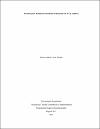Acciones para fortalecer el turismo de bienestar en el Eje cafetero
Fecha de publicación
2021-05-28Idioma del documento
spaResumen
El presente trabajo tiene como objetivo identificar las estrategias de negociación internacional que permiten dinamizar el desarrollo del sector turístico de bienestar del eje cafetero. La metodología utilizada fue cualitativa, exploratoria, documental, teniendo como base la teoria de competitividad de Michael Porter; comenzando con un diagnóstico del subsector de bienestar en Colombia, donde se pretende conocer éste subsector en la región cafetera, adicional la importancia de la reglametación en seguridad frente a la pandemia mundial y la apuesta a la reactivación del turismo para lograr nuevamente un aporte significativo en el PIB.
Seguido de identificar los factores potenciales en el portafolio de servicios, resaltando las actividades de turismo de bienestar y lugares representativos del sector, que aportan a la economía y desarrollo de la población.
Por último, se determinan acciones para visibilizar el potencial del turismo de bienestar en el eje cafetero, con las cuales se esperaría generar una experiencia de valor al turista y que sea una zona de preferencia a la hora de elegir.
Al finalizar el estudio se pudo concluir que el eje cafetero sobresale en termalismo y terapias holísticas, así mismo, las estrategias planteadas buscan potencializar el turismo de bienestar e internacionacionalización de servicios, además de lograr la participación no solo de las grandes cadenas hoteleras, fijando un pilar de desarrollo que involucre la población local, teniendo en cuenta la conexión de las personas, los ancestros, las tradiciones y la cultura.
Abstract
The objective of this study is to identify the international negotiation strategies that allow to dynamize the development of the wellness tourism sector in the coffee-growing region. The methodology used was qualitative, exploratory, documentary, based on the competitiveness theory of Michael Porter; starting with a diagnosis of the well-being subsector in Colombia, where it is intended to know this subsector in the coffee region, additionally the importance of safety regulations in the face of the global pandemic and the commitment to the reactivation of tourism to achieve a significant contribution in GDP.
Followed by identifying the potential factors in the portfolio of services, where it is intended to know the activities of wellness tourism and representative places of the sector that offer such services, that contribuite to the economy and development of the population.
Finally, actions are determined to make visible the potential of wellness tourism in the coffee-growing region, with which it would be expected to generare an experience of value to the tourist and that it is an area of preference when choosing.
At the end of the study it was concluded that Colombia excels in thermalism and holistic therapies, likewise, the strategies proposed seek to draw attention to the development that brings tourism and the relevance of international negotiation, which seek to form something beyond the large hotel chains, setting a pillar of development that involves the local population taking into account the connection of people, ancestors, traditions and culture.
Palabras clave
Colecciones
 Esta obra está bajo licencia internacional Creative Commons Reconocimiento-NoComercial 4.0.
Esta obra está bajo licencia internacional Creative Commons Reconocimiento-NoComercial 4.0.

